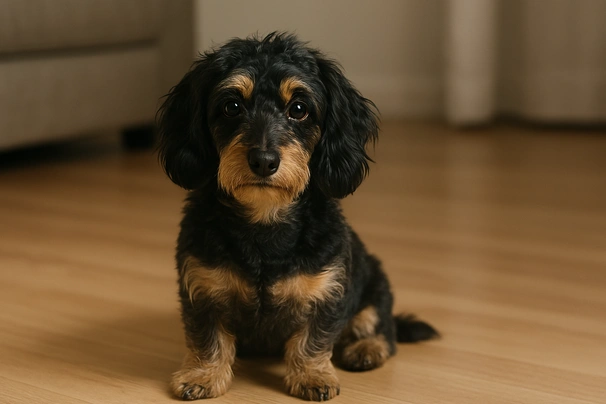Doxiepoo
Pros
Cons
Introduction of the Doxiepoo
The Doxiepoo is a delightful cross between the playful Dachshund and the intelligent Poodle. This small designer breed has gained popularity due to its quirky looks, affectionate nature, and intelligence. Combining the loyal personality of the Dachshund with the cleverness of the Poodle, the Doxiepoo is a companion dog through and through.
History of the Doxiepoo
The Doxiepoo is a relatively modern hybrid breed, developed during the designer dog trend of the late 20th century. The aim was to create a small, hypoallergenic, and intelligent companion dog by blending the Dachshund’s unique appearance and lively temperament with the Poodle’s intelligence and allergy-friendly coat. Today, Doxiepoos are adored for their distinct personality and versatility.
Appearance of the Doxiepoo
Since both parents have contrasting features, Doxiepoos come in a wide variety of appearances. They may inherit the long body and short legs of the Dachshund or have a more balanced, Poodle-like frame. Their coat can be curly, wavy, or wiry, depending on genetics. Common coat colors include black, brown, cream, gray, or combinations of these. Their expressive eyes and playful expression make them especially charming.
Temperament of the Doxiepoo
Doxiepoos are loving, playful, and loyal companions. They thrive on human interaction and can be very attached to their family. They are often good with children and enjoy being involved in family activities. However, they may inherit a slight stubborn or independent streak from their Dachshund parent, which can make training more challenging without patience and consistency.
Intelligence / Trainability of the Doxiepoo
Thanks to their Poodle heritage, Doxiepoos are highly intelligent and curious dogs. They enjoy learning and can excel in obedience or trick training if properly motivated. However, their independent Dachshund side may cause them to test boundaries, so training should always be fun and rewarding.
Doxiepoos are moderately easy to train, especially if training starts early. They respond well to positive reinforcement but may display occasional stubbornness. Consistency, patience, and mental stimulation are essential to prevent boredom and unwanted behaviors.
Children and other
Doxiepoos are generally good with children, particularly older kids who know how to handle small dogs gently. They enjoy playtime but may become overwhelmed by rough handling, especially due to their potential for back problems. Supervision is recommended with young children.
Health of the Doxiepoo
Doxiepoos, while benefiting from hybrid vigor, are prone to several health issues inherited mainly from their Dachshund parent:
-
Intervertebral Disc Disease (IVDD): This is the most significant health concern for Doxiepoos. The long-backed structure increases the risk of spinal disc problems leading to pain or paralysis. Jumping and rough play should be minimized.
-
Patellar Luxation: Kneecap dislocation, common in small breeds, can cause intermittent lameness.
-
Progressive Retinal Atrophy (PRA): An inherited eye disease that can lead to blindness.
-
Cataracts: Can occur, especially as the dog ages.
-
Hip Dysplasia: Though less common due to their size, it may still affect Doxiepoos.
-
Dental Disease: Their small mouths may lead to overcrowded teeth and dental issues.
-
Allergies: Skin allergies and sensitivities can develop, leading to itching and discomfort.
Early screening for IVDD, patella, and eye conditions is strongly recommended. Maintaining a healthy weight and providing gentle exercise is essential to reduce strain on the back.
Caring for the Doxiepoo
Doxiepoos are best suited for homes where they are not left alone for extended periods. They thrive on companionship, play, and gentle physical activity. Their small size makes them adaptable to both apartments and larger homes. Avoid letting them jump off furniture to protect their backs.
Grooming of the Doxiepoo
The grooming needs of a Doxiepoo will depend on their coat type. Curly or wavy coats require brushing several times a week and regular professional grooming to prevent mats. Dogs with smoother coats may need less frequent grooming. Routine ear cleaning, dental care, and nail trimming are essential.
Exercise of the Doxiepoo
Doxiepoos have moderate exercise needs. Daily walks, interactive play, and mental stimulation are sufficient. Avoid intense jumping or activities that could strain their back due to the risk of IVDD. Puzzle toys and gentle play are highly recommended.
Feeding of the Doxiepoo
Feed your Doxiepoo a balanced, portion-controlled diet appropriate for their size and activity level. Avoid overfeeding, as excess weight increases the risk of spinal problems. Small breed or joint-support formulas may be beneficial.
Buying advice
The Doxiepoo is ideal for families, singles, or seniors looking for a small, affectionate, and intelligent companion. They are best suited for owners who can provide them with company for most of the day and who are aware of their back-related health risks. Gentle handling and a proactive approach to training and health care will help a Doxiepoo thrive.
